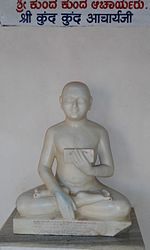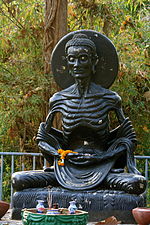Non-possession (Sanskrit: अपरिग्रह, aparigraha) is a religious tenet followed in Buddhist, Hindu, and Jain traditions in South Asia. In Jainism, aparigraha...
34 KB (4,190 words) - 08:28, 7 November 2024
Spirit possession is an unusual or an altered state of consciousness and associated behaviors which are purportedly caused by the control of a human body...
92 KB (11,134 words) - 23:26, 21 November 2024
adverse possession action differ by jurisdiction, a person claiming adverse possession in a common law system is usually required to prove non-permissive...
47 KB (6,394 words) - 18:29, 15 November 2024
Jainism (section Non-violence (ahimsa))
aparigraha which means non-attachment to worldly possessions. For monks and nuns, Jainism requires a vow of complete non-possession of any property, relations...
144 KB (15,872 words) - 04:56, 3 November 2024
Japan's non-nuclear weapons policy is a policy popularly articulated as the Three Non-Nuclear Principles of non-possession, non-production, and non-introduction...
15 KB (1,876 words) - 11:48, 1 October 2024
consider as important. Digambara monks cherish the virtue of non-attachment and non-possession of any material goods. Monks carry a community-owned picchi...
49 KB (4,973 words) - 13:37, 12 November 2024
blue – represents the Jain ascetics. It also signifies aparigraha (non-possession). In Jainism, Om is considered a condensed form of reference to the...
11 KB (1,177 words) - 06:47, 2 October 2024
Criminal possession of a weapon is the unlawful possession of a weapon by an individual. It may also be an additional crime if a violent offense was committed...
8 KB (1,025 words) - 16:08, 2 June 2024
to that between alienable and inalienable possession, is made between inherent and non-inherent possession. In languages that mark the distinction, inherently-possessed...
10 KB (1,103 words) - 02:09, 18 December 2023
identity card when a person reaches a prescribed age. The penalty for non-possession is usually a fine, but in some cases it may result in detention until...
189 KB (22,501 words) - 04:26, 4 November 2024
modern culture. Mahatma Gandhi's main exception to his lifestyle of non-possession was a small statue of the three monkeys - Bapu, Ketan and Bandar - which...
17 KB (1,894 words) - 18:53, 14 November 2024
1972. In 1967, Satō introduced the "Three Non-Nuclear Principles" (the non-production, non-possession, and non-introduction of nuclear weapons in Japan)...
31 KB (2,811 words) - 23:10, 21 November 2024
The possession and acquisition licence (PAL; French: permis de possession et d'acquisition) is the primary firearms licence under Canadian firearms laws...
11 KB (1,356 words) - 20:14, 15 November 2024
adopt a frugal lifestyle, characterised by the renunciation of material possessions and physical pleasures, and also spend time fasting while concentrating...
86 KB (9,572 words) - 17:55, 11 November 2024
The Loudun possessions, also known as the Loudun possessed affair (French: affaire des possédées de Loudun), was a notorious witchcraft trial that took...
24 KB (3,341 words) - 23:43, 22 October 2024
Parshvanatha's four restraints were ahimsa, aparigraha (non-possession), asteya (non-stealing) and satya (non-lying). Ancient Buddhist texts (such as the Samaññaphala...
59 KB (6,039 words) - 19:21, 18 November 2024
householders Aparigraha (non-attachment): For lay people, an attitude of non-attachment to property or worldly possessions; for mendicants, not owning...
76 KB (8,251 words) - 05:34, 19 November 2024
of Jainism; Ahimsa (non-violence), Satya (not lying), Asteya (not stealing), Brahmacharya (chastity), and Aparigraha (non-possession). A further seven supplementary...
41 KB (4,395 words) - 08:57, 14 October 2024
observance of the five supreme vows of ahimsa (non-injury), truth, non-thieving, celibacy and non-possession. A Digambar Sādhu is allowed to keep only a...
20 KB (2,524 words) - 20:12, 3 October 2024
In linguistics, inalienable possession (abbreviated INAL) is a type of possession in which a noun is obligatorily possessed by its possessor. Nouns or...
70 KB (7,971 words) - 17:58, 14 September 2024
Nonattachment (philosophy) (redirect from Non-attachment)
Detachment is one of the supreme ideals of Jainism, along with non-violence. Non-possession/non-attachment is one of the Mahavratas, the five great vows that...
9 KB (1,095 words) - 00:19, 25 March 2024
good Sramana. The chapter on renunciation contains a śramaṇa vow of non-possession: I shall become a śramaṇa who owns no house, no property, no sons, no...
73 KB (8,882 words) - 16:00, 10 November 2024
percent. James defined affluenza as "placing a high value on money, possessions, appearances (physical and social) and fame", which was the rationale...
9 KB (1,064 words) - 15:40, 29 October 2024
world and developed a desire for renunciation. Bahubali abandoned all possessions-kingdom, clothes, ornaments-to become a monk and began meditating with...
22 KB (2,127 words) - 12:30, 26 October 2024
These five vows are: Ahiṃsā (Non-violence) Satya (Truth) Asteya (Non-stealing) Brahmacharya (Chastity) Aparigraha (Non-possession) According to the Jain text...
26 KB (3,277 words) - 20:27, 11 August 2024
the monks and nuns who take five great vows: of non-violence, of truth, of non-stealing, of non-possession and of celibacy. Most of the austerities and ascetic...
46 KB (6,340 words) - 01:33, 18 November 2024
Anekantavada (redirect from Non-absolutism)
schools of philosophies. Anekantavada has also been interpreted to mean non-absolutism, "intellectual Ahimsa", religious pluralism, as well as a rejection...
72 KB (8,875 words) - 16:53, 18 November 2024
Khwe language (category Pages with non-English text lacking appropriate markup and no ISO hint)
vé, which can be used to indicate non-occurrence of an event, non-equation between entities, and the non-possession of an entity. The post-verbal particle...
25 KB (2,531 words) - 07:40, 18 September 2024
represents the sadhus and sadhvis or monks and nuns. It also signifies non-possession (aparigraha). It is also believed that the complexion of all the 24...
4 KB (523 words) - 05:48, 25 May 2024
escaping from work-and-spend cycle, and removing the clutter of unnecessary possessions. The personal goals of downshifting are simple: To reach a holistic self-understanding...
16 KB (2,046 words) - 19:52, 10 May 2024


















